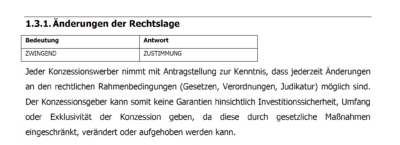By decision of 10 October 2011, Österreichische Lotterien GmbH (“ÖLG”) was granted the “Licence to conduct lotteries pursuant to §§ 6 to 12b GSpG” for the period from 1 October 2012 to 30 September 2027. The granting of this licence was preceded by a Europe-wide application procedure on the basis of the Document for participation in the public search for interested parties – lottery licence.
In recent weeks, the opinion has been expressed in many places that this lottery licence is exclusively valid until 2027. This is – apart from the fact that, in our view, the Austrian gaming monopoly is clearly contrary to EU law – incorrect. Under the heading “Changes in the legal situation”, Point 1.3.1 of the “Document for participation in the public search for interested parties – lottery licence” contains the following provision:

Each applicant had to agree to this provision when submitting its application and was therefore aware that “changes to the legal framework (laws, regulations, jurisprudence) are possible at any time” and that there are therefore no “guarantees regarding investment security, scope or exclusivity of the concession”. Of course, this also applies to the ÖLG, which ultimately received the license. Following a corresponding legal amendment and a Europe-wide tendering procedure, further licences for the conduct of “electronic lotteries” (online gambling) can thus be granted at any time. From the point of view of European law, market access must not be limited in number, but must be linked to compliance with content criteria.
The OVWG advocates an open and transparent licensing system for the online sector in Austria. The existing Austrian gambling monopoly, which contravenes EU law, is virtually contrary to the idea of digitisation. In future, the market must be opened up to all providers who work responsibly and adhere to high standards of player protection. Best practice examples in the EU (such as Denmark) show how this can work. Such sustainable regulation creates an advantageous system for all: complete supervision and guaranteed tax revenues for the state, legal certainty for responsible providers and high player protection standards for customers. We would also like to see the same for Austria.
Do you have any further questions? Don’t hesitate to get in touch.
